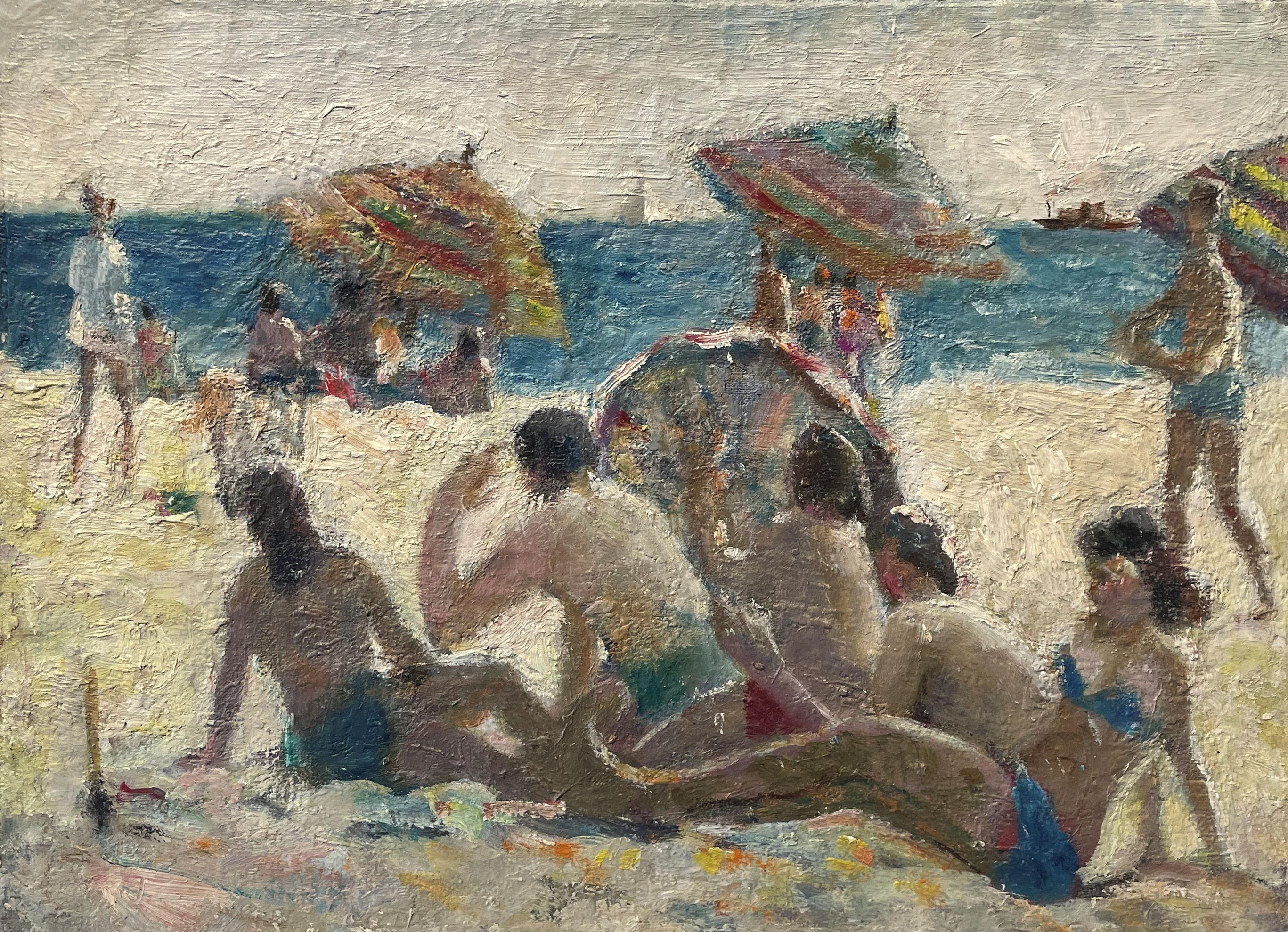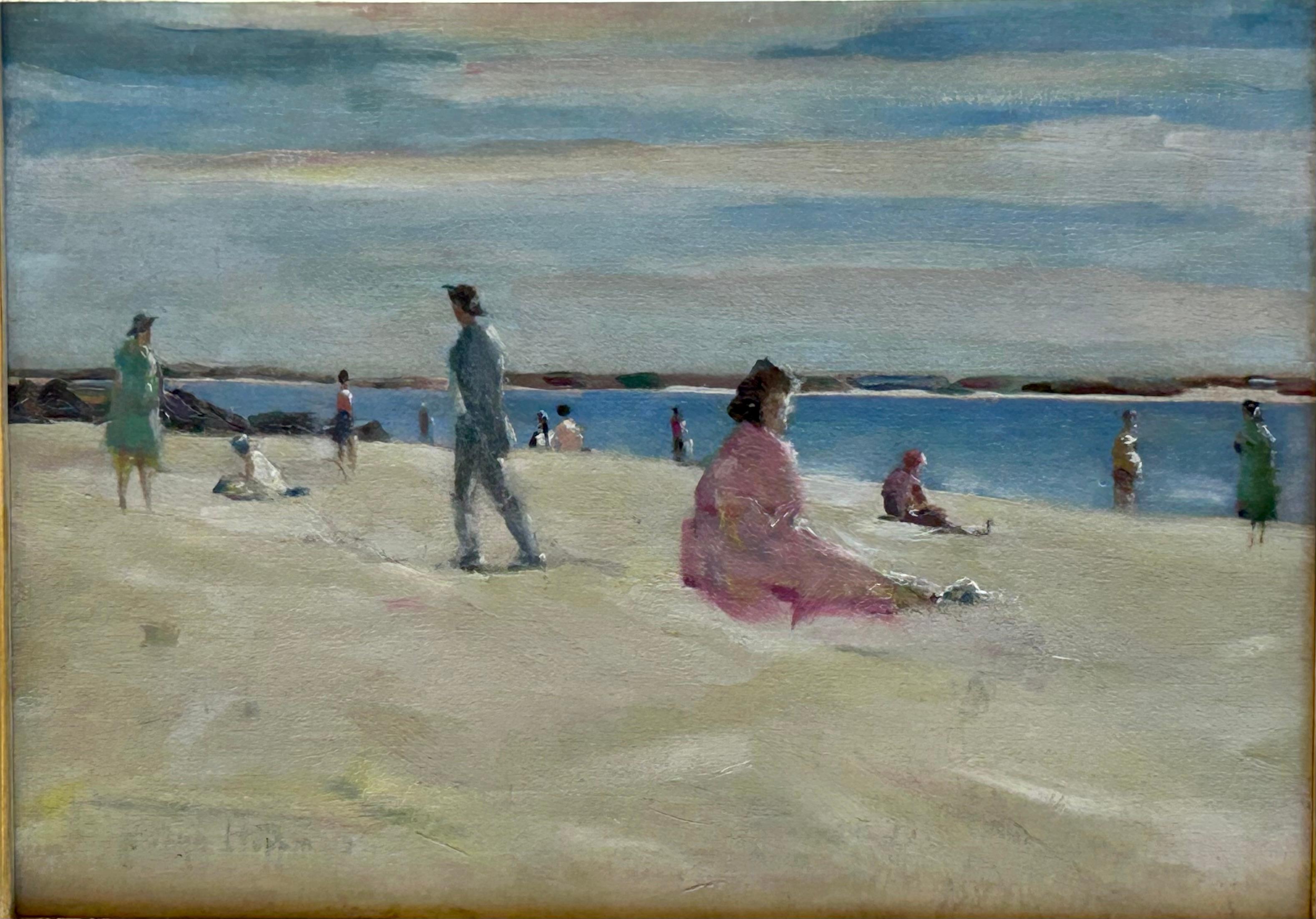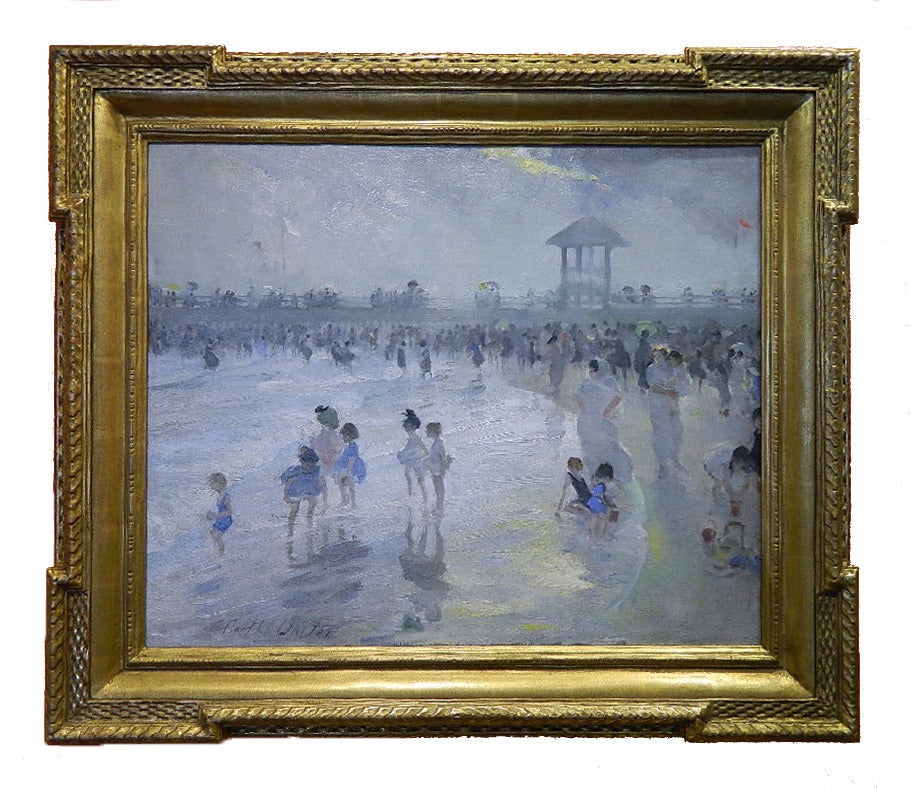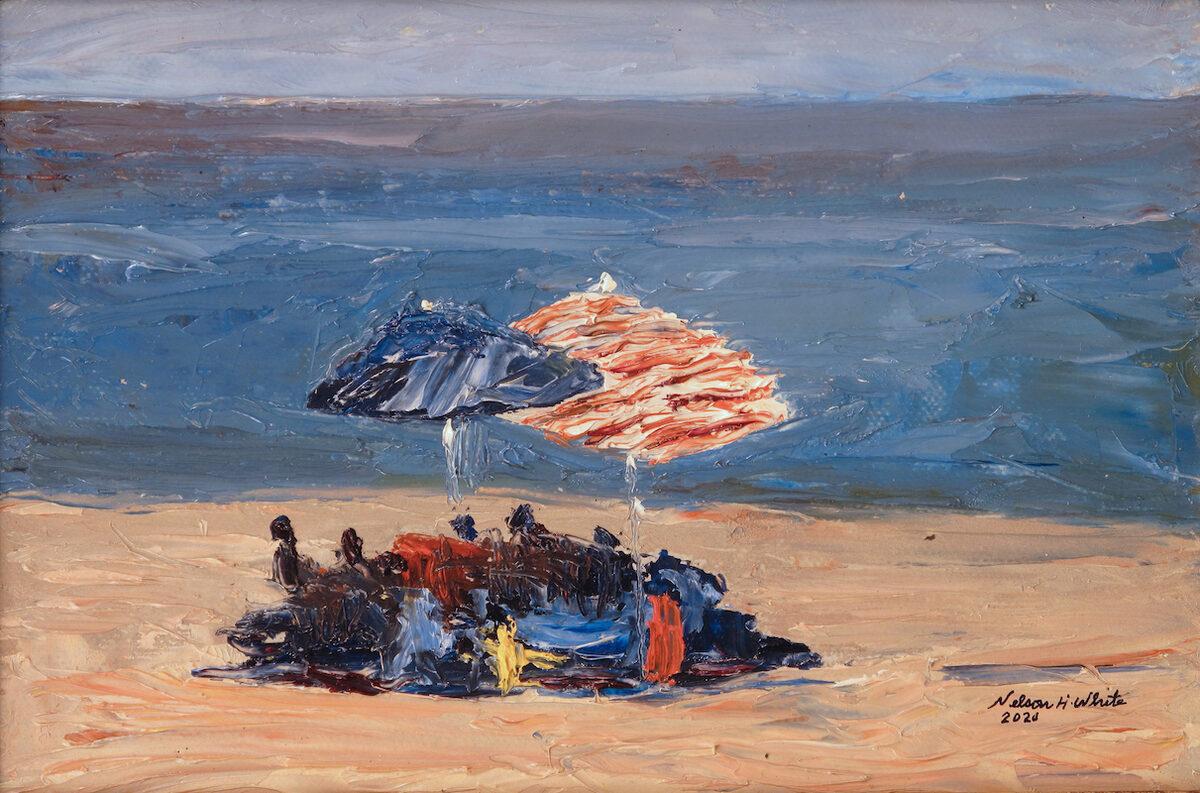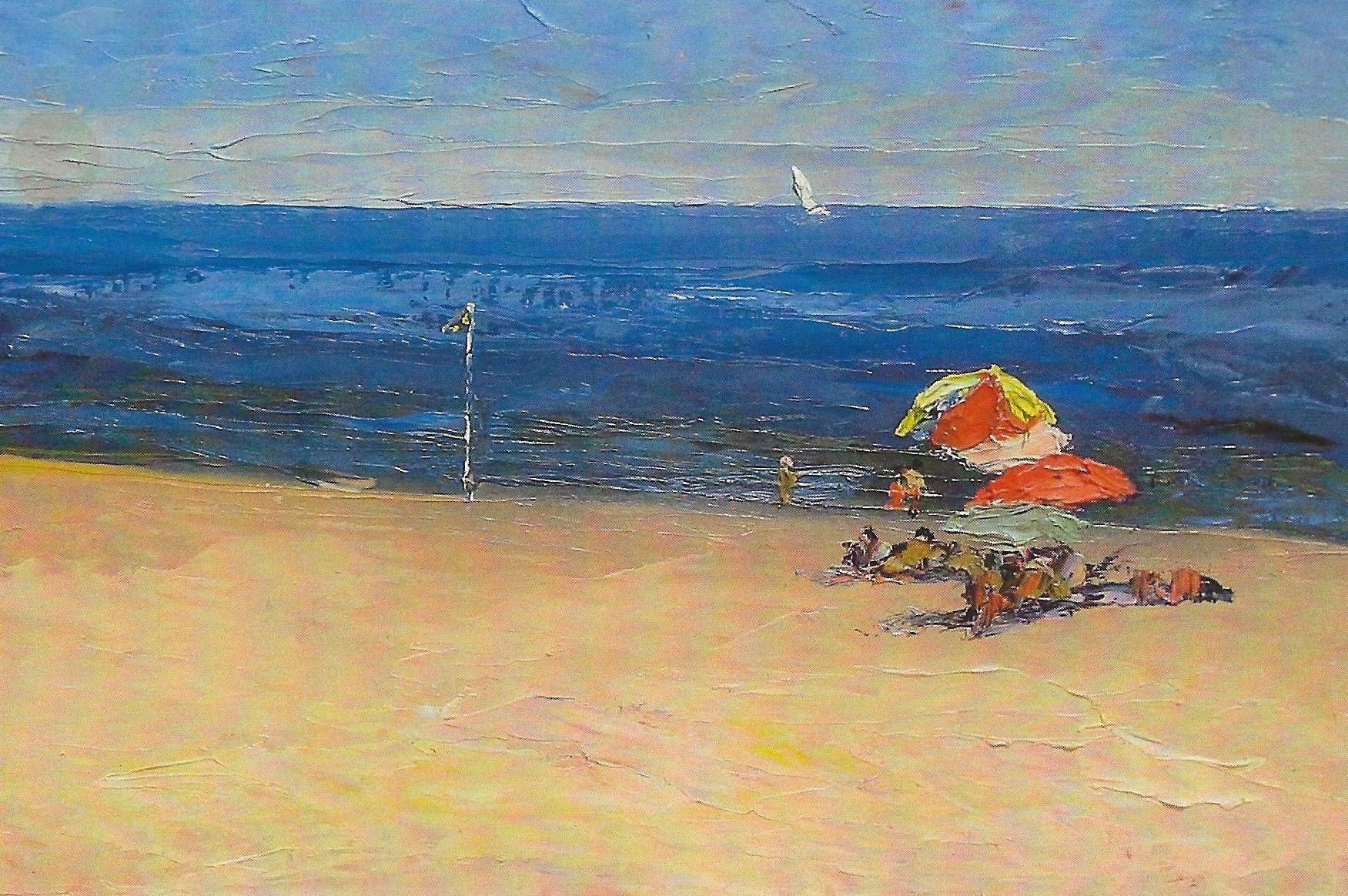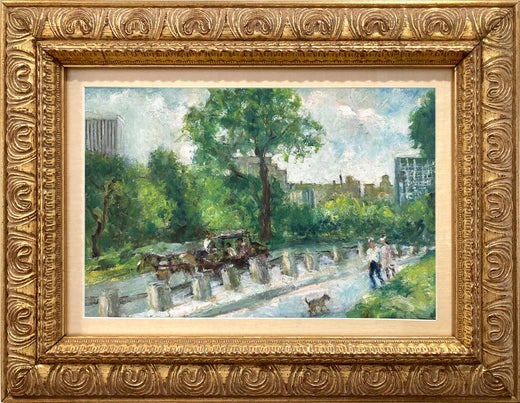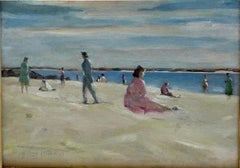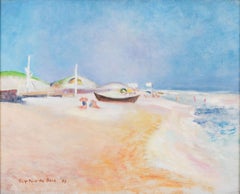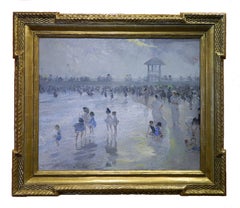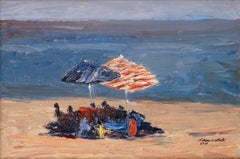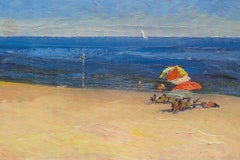Items Similar to "Brighton Beach, August 5" Nathan Hoffman, Brooklyn, Impressionist, Sunny Day
Want more images or videos?
Request additional images or videos from the seller
1 of 8
Nathan Hoffman"Brighton Beach, August 5" Nathan Hoffman, Brooklyn, Impressionist, Sunny Day1941
1941
$3,000
£2,277.59
€2,610.05
CA$4,258.10
A$4,644.51
CHF 2,439.88
MX$56,189.10
NOK 30,523.72
SEK 28,820.47
DKK 19,482.19
About the Item
Nathan Hoffman
Brighton Beach, August 5, 1941
Signed, titled, dated and estate stamped on the reverse
Oil on board
9 3/4 x 14 inches
Born in Russia, the son of Friede (1878 – 1956) and Benjamin Hoffman (1878 – a. 1942). Benjamin was a dealer in mineral and seltzer water and the family resided on Snediker Avenue in Brooklyn, New York, just down the streetfrom the home where George Gershwin (1898 – 1937) was born.
This area of Brooklyn, known as Brownsville, “witnessed the development of one of the largest communities of Eastern European Jewish immigrants during the last decade of the 19th century and the first two decades of the 20 th century.” Today, little remains of this once thriving Jewish section of Brooklyn, which today houses many commercial and repair businesses.
Hoffman studied at the Art Students League of New York, the National Academy of Design and in the art program at Cooper Union. His work at the National Academy received praise, and in 1921 he was awarded the 2nd prize and an honorable mention from the John Armstrong Chaloner Paris Prize Foundation at the National Academy, which allowed the recipient to study in Paris, France for as long as five years. The following year he was awarded the 1 st prize in the competition (with The Reform Advocate running the headline “Young Jew Wins Art Prize”) as well as the Suydam Bronze Medal for his achievements in the Academy’s Men’s Night Class. In 1923 he was residing in Long Branch, New Jersey, when he was awarded 4th place in the Chaloner competition.
Early on, Hoffman exhibited his work throughout the city, including in 1925 with the recently organized Society of Independent Artists. He also received several solo exhibitions during the first part of his career, including one at Ferargil Galleries in 1929. In the spring of 1930 a solo exhibition of his portraits, including paintings and drawings, was held at at Babcock Galleries, where a reviewer noted: “Portraiture is obviously Mr. Hoffman’s specialty… his best work is characterized by a sensitive appreciation of character set down in a vigorous decisive statement.
Later that same year, in August, he participated in Babcock’s summer exhibition where reviewer Jerome Klein, writing for The Baltimore Sun, felt Hoffman’s and other artists work was already becoming old fashioned, remarking “…if an effort toward accomplishment is to be made, it must be in the language of today. It is for that reason that such contemporaries as Eugene Higgins and Nathan Hoffman, in this show, seem artists of a bygone era…” The onset of the Great Depression appears to have slowed his success, as was the case for many up-and-coming artists.
By 1939 Hoffman had become a gallerist in addition to being a painter, operating the collective exhibition space “Sutton Gallery,” which was originally located at 358 East 57th Street. There Hoffman exhibited his own works as well as those created by other prominent New York artists including David Burliuk (1882 – 1967), Charles C. Curran (1861 – 1942), Louis Eilshemius (1864 – 1941), Ann Goldthwaite (1869 – 1944), Maurice Kish (1895 – 1987), Lawrence Lebduska (1894 – 1966), Bradford Perin and Ellis Wilson (1899 – 1977), among others.
Hoffman continued to exhibit his and other artist’s works at the gallery through at least 1963, by which time it had moved to 236 East 60th Street. That year he held a spring exhibition which was dominated by early 20 th century artists, including Charles W. Hawthorne (1872 – 1930) and Joseph Stella (1877 – 1946). Among the works he personally exhibited in the show was a portrait he painted of National Academician, Alphaeus P. Cole (1876 – 1988). Even with his own retail space, Hoffman continued to exhibit elsewhere in the city, including at The Jewish Club and at the Washington Square Artist’s Fair.
Nathan Hoffman died in Flushing, Queens, New York on Sunday, the 20 th of May 1979 at the age of seventy-nine years. At present it is not known where his service was held, however he was interred at New Montefiore Cemetery in West Babylon, New York. An alternate birth date of April 23, 1900 was noted on his World War I registration card, however nearly all other documents record as his birth occurring in February, indicating the April date is likely an error.
Most of what is known about Hoffman is through the several groupings of figurative, landscape and seascape paintings that have appeared on the market over the years. He seems to have been particularly interested in painting in Brooklyn at Brighton Beach, Coney Island and elsewhere in the environs of New York City. Many of these works are small in size, indicating many of them were painted en-plein-air. His earlier works are impressionist in style, though during his later years some abstractions do appear. Hoffman signs his name fully on his paintings as “Nathan Hoffman” and they are often signed and fully dated on the verso as well.
Though there are undoubtedly other exhibitions in which Hoffman participated, those presently known include the following: Society of Independent Artists, New York, NY, 1925; Ferargil Galleries, New York, NY, 1929 (solo); Babcock Galleries, New York, NY, 1930 (twice, spring solo & summer group exhibition); National Academy of Design, New York, NY, 1931; Allied Art Festival Exhibition, Spring Lake, NJ, 1935; Sutton Gallery, New York, NY, 1939 – 63 (solos & group shows); Podell Art Exhibition, New York, NY, 1939; The Jewish Club, New York, NY, 1945? (solo); Kettler Group Exhibition, New York, NY, 1953; Washington Square Artists Fair, New York, NY, (u.d.).
Hoffman’s works are not presently known to be in the collection of any public institutions, however his works reside in many private collections throughout the United States.
- Creator:Nathan Hoffman (1900 - 1979, American)
- Creation Year:1941
- Dimensions:Height: 16 in (40.64 cm)Width: 20 in (50.8 cm)
- Medium:
- Movement & Style:
- Period:
- Condition:
- Gallery Location:New York, NY
- Reference Number:1stDibs: LU1841212878092
Nathan Hoffman “Nathaniel Hoffman” was born on February 15, 1900. He studied at the Art Students League of New York, the National Academy of Design, and in the art program at Cooper Union. His work at the National Academy received praise, and in 1921 he was awarded the 2nd prize and an honorable mention from the John Armstrong Chaloner Paris Prize Foundation at the National Academy, which allowed the recipient to study in Paris, France for as long as five years. In 1923 he was residing in Long Branch, New Jersey, when he was awarded 4th place in the Chaloner competition. Early on, Hoffman exhibited his work throughout New York City, including in 1925 with the Society of Independent Artists. He also participated in several solo exhibitions during the first part of his career, including one at Ferargil Galleries in 1929. In the spring of 1930 a solo exhibition of his portraits, including paintings and drawings, was held at Babcock Galleries, where a reviewer noted: “Portraiture is obviously Mr. Hoffman’s specialty… his best work is characterized by a sensitive appreciation of character set down in a vigorous decisive statement". Later that same year, in August, he participated in Babcock’s summer exhibition. By 1939 Hoffman had become a gallerist in addition to being a painter, operating the collective exhibition space “Sutton Gallery,” which was originally located at 358 East 57th Street where Hoffman exhibited his works next to other prominent New York artists including David Burliuk among others. Hoffman continued to exhibit his and other artist’s works at the gallery through at least 1963, by which time it had moved to 236 East 60th Street. That year he held a spring exhibition dominated by early 20th century artists, including Charles W. Hawthorne and Joseph Stella. Most of what is known about Hoffman is through the several groupings of figurative, landscape, and seascape paintings that have appeared on the market over the years, showing a particular interest in painting in Brooklyn at Brighton Beach, Coney Island and elsewhere in the environs of New York City. Many of his works are small in size, indicating many of them were painted En plein air. Although his earlier works are impressionist in style, during his later years some abstract works do appear. Hoffman’s works are not presently known to be in the collection of any public institutions, however, his works reside in many private collections throughout the United States. Nathan Hoffman died in Flushing, Queens, New York on Sunday, the 20th of May 1979 at the age of seventy-nine years.
About the Seller
5.0
Platinum Seller
Premium sellers with a 4.7+ rating and 24-hour response times
Established in 2022
1stDibs seller since 2022
123 sales on 1stDibs
Typical response time: <1 hour
- ShippingRetrieving quote...Shipping from: New York, NY
- Return Policy
Authenticity Guarantee
In the unlikely event there’s an issue with an item’s authenticity, contact us within 1 year for a full refund. DetailsMoney-Back Guarantee
If your item is not as described, is damaged in transit, or does not arrive, contact us within 7 days for a full refund. Details24-Hour Cancellation
You have a 24-hour grace period in which to reconsider your purchase, with no questions asked.Vetted Professional Sellers
Our world-class sellers must adhere to strict standards for service and quality, maintaining the integrity of our listings.Price-Match Guarantee
If you find that a seller listed the same item for a lower price elsewhere, we’ll match it.Trusted Global Delivery
Our best-in-class carrier network provides specialized shipping options worldwide, including custom delivery.More From This Seller
View All"Brighton Beach" Nathan Hoffman, New York, Sunny Day Landscape Impressionism
Located in New York, NY
Nathan Hoffman
Brighton Beach, July 31, 1946
Signed, dated, and estate stamped on the reverse
Oil on artist's board
10 x 13 1/2 inches
Provenance:
Esta...
Category
1940s American Impressionist Landscape Paintings
Materials
Oil, Board
"The Beach" Nathan Hoffman, Brooklyn, New York, Sunny Day Landscape
Located in New York, NY
Nathan Hoffman
The Beach
Estate stamped on the reverse
Oil on artist's board
10 1/4 x 14 inches
Provenance:
Estate of the artist
Born in Russia, the s...
Category
1940s American Impressionist Landscape Paintings
Materials
Oil, Board
"Ocean Parkway Beach, October 2" Nathan Hoffman, Brooklyn, Impressionist
Located in New York, NY
Nathan Hoffman
Ocean Parkway Beach, October 2, 1941
Signed, titled, dated on the reverse
Oil on artists board
9 3/4 x 14 inches
Born in Russia, the son...
Category
1940s American Impressionist Landscape Paintings
Materials
Oil, Board
"Seaside (Amagansett Beach)" Guy Pène du Bois, American Realist Beach Scene
By Guy Pène Du Bois
Located in New York, NY
Guy Pene du Bois
Seaside (Amagansett Beach), 1939
Signed and dated lower left; artist label on the reverse: "Seaside CAT No 192"
Oil on canvas
16 x 20 inches
Pène du Bois descended...
Category
1930s Realist Figurative Paintings
Materials
Oil, Canvas
"Day at the Beach, " Charles Hoffbauer, Family at the Ocean, Sunny Landscape
By Charles Hoffbauer
Located in New York, NY
Charles Constantine Hoffbauer (1875 - 1957)
Day at the Beach (Mother and Child)
Oil on paper
10 x 8 inches
Hoffbauer was born in Paris in 1875, the son of an Alsatian architect, artist and archaeologist who published Paris through the Ages. He studied at the Ecole des Beaux-Arts under Fernand Cormon and Gustave Moreau, rubbing shoulders with Matisse, Rouault, and Marquet, then won an Honorable Mention in the Salon of 1896 and academic prizes in 1898-99. At the Paris Universal Exposition he won a bronze medal. On a French government traveling scholarship called the Prix National du Salon, Hoffbauer discovered Italy, Greece and Egypt. Then the government purchased Champs de bataille in 1904 (Musée du Luxembourg). On a second scholarship in late 1909, Hoffbauer visited New York where he was greeted by his friend Charles Dana Gibson (1867-1944), the creator of the "Gibson Girl." Hoffbauer was given two solo shows in 1911 and 1912 at Knoedler's, where his work would be handled in America In the introduction to the 1912 exhibition catalogue, art writer Arthur Hoeber...
Category
Early 20th Century American Impressionist Landscape Paintings
Materials
Paper, Oil
"Day at the Beach, " Nikol Schattenstein, Sunny Seaside Belgian Figurative Scene
By Nikol Schattenstein
Located in New York, NY
Nikol Schattenstein (1877 - 1954)
Day at the Beach
Oil on canvas
27 3/4 x 33 1/2 inches
Signed lower left
Provenance:
Descended in the family of the artist
Estate of Howard Aronso...
Category
Early 20th Century Impressionist Landscape Paintings
Materials
Canvas, Oil
You May Also Like
"Late Afternoon at Brighton Beach"
By Martha Walter
Located in Lambertville, NJ
Jim’s of Lambertville Fine Art Gallery is proud to present this piece by Martha Walter (1875 - 1976).
Born in Philadelphia in 1875, Martha Walter attended Girls’ High School followe...
Category
1910s American Impressionist Figurative Paintings
Materials
Canvas, Oil
"Coopers Beach, Southampton 07.25.20" impressionist, landscape of beach, LI
By Nelson White
Located in Sag Harbor, NY
Lifelong painter Nelson H. White (b. 1932, Connecticut) is widely appreciated for his loyalty to natural landscapes and intimate impressionism. His loose brushstrokes are skillfully ...
Category
21st Century and Contemporary Impressionist Landscape Paintings
Materials
Oil, Panel
Coopers Beach, Southampton NY (August 12, 2019)
By Nelson White
Located in Sag Harbor, NY
A Nelson White plein air painting.
Framed dimensions: 18.5 x 26.5 inches
Artist Bio
Nelson H. White was born in New London, Connecticut in 1932. White has been surrounded by art an...
Category
21st Century and Contemporary Impressionist Landscape Paintings
Materials
Oil
Beach Ocean Impressionistic Seascape Oil Painting Michael Budden Beach Day II
By Michael Budden
Located in Chesterfield, NJ
Beach Day II
oil/canvas
11 x 14 image unframed, 17.5 x 20.25 framed
Beach Day II is an oil painting on canvas by award winning contemporary artist Michael Budden that showcases a be...
Category
21st Century and Contemporary American Impressionist Landscape Paintings
Materials
Oil
Beach at Playa Del Rey California
Located in Missouri, MO
Beach at Playa Del Rey California by Louis Carl Hvasta (1913-1993)
Signed and Dated Lower Left
Unframed: 21" x 34"
Framed: 28.25" x 41"
Frame was Hand made by ...
Category
20th Century American Impressionist Landscape Paintings
Materials
Oil, Panel
Price Upon Request
BEACH SCENE American Impressionist gouache 20th century 1030s bright colors
By Jane Peterson
Located in New York, NY
Jane Peterson was born in Elgin, Illinois in 1876. Peterson attended the Pratt Institute and later she studied at the Art Students League in New York with Frank Vincent Dumond. Follo...
Category
1930s American Impressionist Paintings
Materials
Gouache
More Ways To Browse
Brooklyn Oil Painting
Hawthorne Vintage
Hoffman Oil
Hoffman Oil Painting
Brighton Painting
Seltzer Water Vintage
Nathan Hoffman
Charles C Curran
Ellis Wilson
1944 Oil
Byam Shaw
Forest Hills
Keith Oil Painting
Vintage Farm Scenes
Yorkshire Landscapes
Antique Maritime Paintings
Architecture San Francisco
California Impressionism
